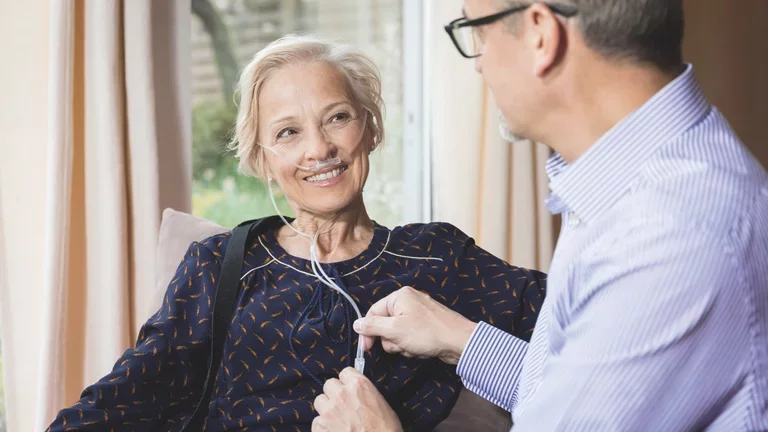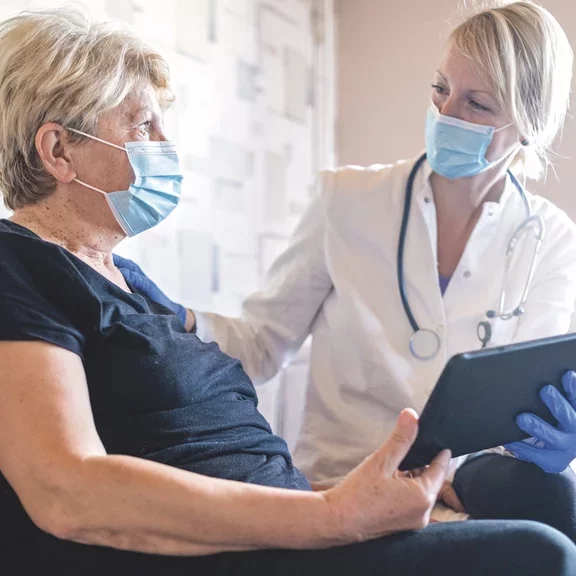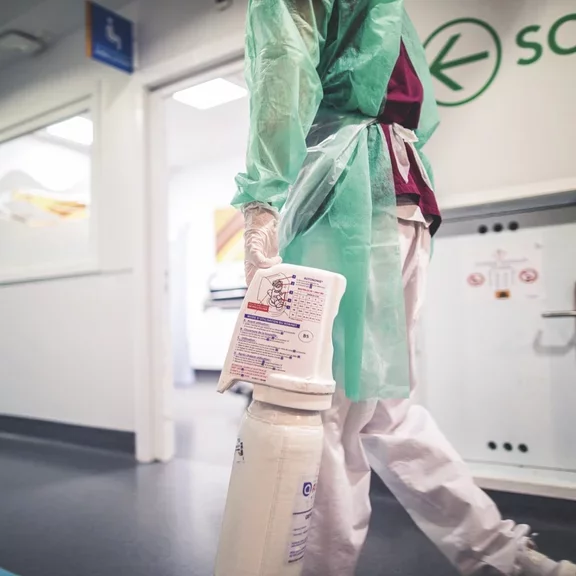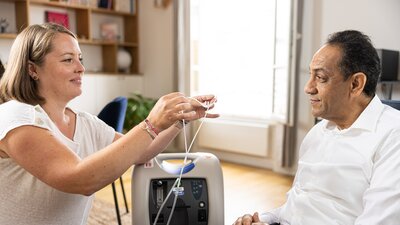Because every patient experiences their illness differently, Air Liquide favors personalized care plans. This is a virtuous approach that aims to improve both the patient’s health and quality of life at the best cost for the healthcare system. Working daily with all healthcare professionals, the Group contributes to the transformation of healthcare at home, in hospitals and in other care settings by offering innovative solutions that create value for all healthcare stakeholders.
2 M patients at home around the world in 2023
55% of whom are following a personalized care plan
Foster

“The Value-Based Healthcare approach returns patients to the heart of the healthcare system, with the goal of improving their quality of life at the best cost for the healthcare system.
”
Dolores Paredes
Vice President of Markets, Strategy and Innovation at Air Liquide’s Healthcare activity
You launched the transformation of Air Liquide’s Home Healthcare business by implementing a Value-Based Healthcare approach. Could you please explain what this means?
This approach focuses on patients beyond their illness. We put them, as people, at the heart of the healthcare system, taking into account everything that makes them unique. By this I mean their relationship with their illness, their history, their lifestyle and even their family situation. We are moving from a service-based approach to an approach that focuses on the key benefits for patients to improve their quality of life in a more cost-effective way. It is a unique opportunity to organize the entire healthcare ecosystem around a common goal. Leading stakeholders are already implementing it in several countries (hospitals, clinics, healthcare systems), and the results are promising. International organizations1 are taking part in this transformation and helping shape healthcare policies that promote the emergence of value-based initiatives.
In what way is this approach strategic for Air Liquide?
Around the world, healthcare systems are facing a two-fold challenge: ensuring their continuity and upholding quality of care. Value-Based Healthcare is now essential for Air Liquide, which is taking long-term action to meet this challenge. Today, Air Liquide takes care of 1.9 million patients with chronic diseases. Our combined human and digital approach allows us to offer them more personalized care plans. Our proximity to our patients and our role as a major player in home healthcare alongside healthcare professionals allow us to contribute to the transformation of healthcare.
What challenges do you face in the coming months?
Although several European countries have begun this patient-centered transformation process, the challenge now is ensuring this initiative is adopted in all regions. We must fundamentally rethink care pathways, with the goal of making them more personalized in order to improve patients’ health and quality of life. We need to prove the value we are generating with this approach, and this requires systematic measurement of the benefits to the patient. This is a complex but exciting task. It requires a coordinated approach from all healthcare professionals in order for the entire ecosystem to reap the benefits. This includes physicians, who can rely on our teams to ensure compliance with treatment, those responsible for covering the costs, who see the optimization of overall care costs, and hospitals, which can focus on critical procedures.

“At hospitals, we offer gases and service solutions that take into account the needs of all medical professionals, while optimizing costs.
”
Louis-François Richard
Vice President of Medical Gases at Air Liquide, Europe
Air Liquide has a major presence in hospitals with medical gases and related services. Accordingly, how can Value-Based Healthcare be adapted to healthcare institutions?
Value-Based Healthcare is a unique approach that encourages all stakeholders to jointly re-examine the benefits for patients and to be involved in the transformation of healthcare systems. We work in partnership with each stakeholder in the healthcare pathway (hospitals, urban medicine and emergency services) to help medical professionals concentrate on tasks with greater added value for patients, while securing the availability of the medical gases they need on a daily basis.
What does that mean specifically?
Today we are only in the early stages of using the Value-Based Healthcare approach to benefit hospitals. But we already have solutions in place that ease the work of caregivers and optimize costs for hospitals. Besides supplying medical gases, we offer services that account for all hospital needs. One example of this is Total Gas Management, which enables everything in the gas logistics process to be managed on the hospital site. Another example is our new line of cylinders for medical oxygen that facilitates the administration of medical oxygen, patient mobility and inventory management for hospital caregivers, who have been in extremely high demand during the pandemic.
Hospitals face a great many challenges. How are you responding to them?
All hospitals do indeed face sizable challenges: accommodating patients in greater and greater numbers, lowering costs without affecting quality of care and participating in regional care networks, all while remaining a hospital of choice. We are adapting to these challenges by redesigning our operational models. As an example, we want to offer a comprehensive care package per patient treated, rather than per products and services supply. Such a model lets us offer optimal quality of care to the benefit of the patient, the healthcare professionals and the healthcare system as a whole.
Achieve
Invent
Re-inventing the care pathway is a crucial factor in improving how the needs of patients are met. Playing a role along with caregivers in the transformation of the healthcare sector, Air Liquide has devised innovative, patient-centric solutions. These approaches foster personalized treatment, to both improve the follow-up care patients receive and their overall quality of life.
Personalized healthcare
Predictive science
Vital molecule
2. A not-for-profit body affiliated with the World Health Organization.






